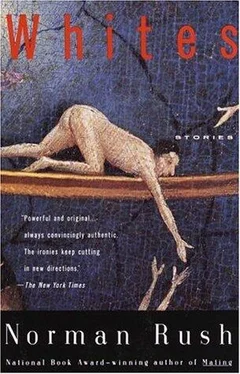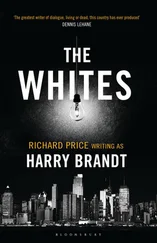At midnight, the dogs woke him — a trio. The barking was listless. It was the heat. Tonight it was so hot he knew he’d never get back to sleep, even if the dogs quit. He sat up slowly. Sweat crept down his sides. It was December. High summer had come.
All the windows were open, and an electric fan sent a stream of tepid air across the foot of the bed. There was an air-conditioner, but Lois was opposed to it. She had once worked for six months in an office at a desk directly under an air-conditioner, and that had been the beginning of the sinus problem, which only Botswana had ever helped. At work, he used his air-conditioner, but guiltily. Lo’s point was that man had evolved without air-conditioning, and that using it had to deprive the body of some positive adaptive exercise. Her main dogma seemed to be to preserve the body’s flexibility, by any means necessary. Lois fasted for a day every couple of weeks, just to be fasting and just because there had to be something in the body’s capacity to adapt that would be triggered by fasting. He wouldn’t relish fasting, but he could see it coming, a cloud no larger than a woman’s hand. He could deal with it.
Carl got out of bed. He was going to be restless. His unhappiness was too great. He knew what he was going to have to do: because of the dogs, he was going to have to sleep alone from now on.
There had to be a good side to this, somewhere, because the pain of it was too much, and the heaviness coming into him. The only thing was that his night vision was improving, from all his creeping around in total darkness. He could get from room to room, find things, fix snacks, all in pitch blackness. It was a useless skill, unless it was rehearsal for blindness or becoming a cat burglar. Another thing was that if he slept in his study, he could work when he was awake. He could attack his paperwork arrears, which were getting to be significant. He could do anything that didn’t involve noise, like typing. Visualizing himself working at night, he felt worse. Working at night was for students, the young.
In his study, Carl lay down on the couch. It was no good: he was sticking to the vinyl surface. He would have to spread towels over the cushions. Being in the study reminded him of an option he’d toyed with early on. He had thought of turning the study into a soundproof chamber, lining the walls with slabs of corkboard gotten from somewhere. That idea had broken up on the reef of ventilation. It would have been like lying in a crypt. There was no way he could have asked Lo to join him there. Now he had to get the towels.
The hinges on the linen closet needed oil. Lo was awake now. He heard her coming out into the hall, saying his name.
She found him at the closet and embraced him. He put the towels down and held her.
He told her he had decided he had to sleep in the study for the time being because he was destroying her sleep. He patted her. He could feel her nodding yes.
A queue lengthened outside the Ministry of Agriculture stand, where a hermaphrodite calf was on display. I could be an exhibit myself, Carl thought. Heat corrugated the hill view over the metal roofs of the food stalls. People could come and marvel at me for being able to stand up.
His plan for Saturday had been to sleep like the dead. But the deputy chief of mission’s wife had struck by phone. Lois had been reminded about what it meant to be an official American. The ambassador wanted total attendance by official Americans at the Red Cross Fête. The D.C.M.’s wife had been blunt. The ambassador was determined that the American exhibit should take second place this year. By custom, first place always went to an African entry. The chief of station said Zambia was looking strong. Second place was between Britain and the United States. Vigorous attendance by an exhibit’s nationals counted with the judges.
An unfamiliar American wife handed Carl a red, white, and blue paper shoulder sash and matching boutonniere. He was wearing a T-shirt, so he attached the rosette to a belt loop at his hip, hoping that that would be acceptable. The American pavilion was major — bigger than ever before. But Carl was picking up anxiety — two kinds of it. The Americans were worried, not by the British but by the Swedes and their Southern Cross Coffee House. Apparently, the Swedes were underpricing tortes and pastries worth a fortune in terms of ingredients, let alone labor. The Batswana were notorious for their love of sweets. The other anxiety was that a certain number of official Americans had been noticed stocking up on tortes for the freezer, until the ambassador had expressed himself on the subject. The word was that the judges were staying a little longer in the coffee house than was standard. It would be unfair if the Swedes won, because their exhibit had only two elements — the coffee house and a borehole-pump demonstration. Carl knew all about the wood-fired pump, which had a bad image among the American technical people. First of all, there was a famous fuel-wood shortage in Botswana. Secondly, even though the pump could run on low-quality coal, which was cheap in Botswana, the cost of transporting coal out into the Kalahari would be too high. America had gone with diversity — a cartoon-show tent, a used-clothes-and-white-elephant table, a fashion show, a bake table, a palmist. Somebody had traveled to the Republic and come back with sausages that could almost pass for American hot dogs. Carl had to make sure that the ambassador saw he was there. Should he go up and say it might be a good idea to charge the Swedes with dumping? He decided not to. He saluted the ambassador from a distance. Lois was around somewhere. She should be seen, too. He went to find her.
The Anglicans had set up their tombola stand in a grove of dying silver oaks. The trees were shedding: the fallen leaves were crisp, like fish bones underfoot. It was the drought. Improvised shelving, braced against a row of trees, held the tombola prizes: canned goods, sundries, Bibles, cheap plastic toys in blisterpacks, five-kilo sacks of mealie and sorghum. There was a crush around the tombola, with Lois at its heart.
Carl made his way to her side. She was a hit. Poor devils were cheering her on, like extras in a gambling movie cheering the heroine at roulette. He loved her. He touched her shoulder. She was damp. He wanted to get her over to the American pavilion, but she was too engrossed. She had won a mountain of things, mostly canned. She hated canned goods, as he recalled. He glanced at a few of the cans. Some of the brands were extinct, he was sure. Storekeepers donated their dead stock to the fête, but some of her prizes looked as though they should have been destroyed instead. That was a merchant for you. But getting rid of old stock was the right thing to do. Lo had won a lifetime supply of pocket combs for him. He let her know that he had to find someplace to sit down. She nodded, preoccupied just then with trying to convey what chutney was to a Herero woman who had won a jar of it. Glum Anglican Auxiliary women were churning up the chances, probably in reaction to Lo’s run of luck. He told Lo to come to the American pavilion as soon as she could, and to find a kid to carry her prizes to the car. Carl said he was going to America, and left.
In the American pavilion, the mood was poor. The judges had been cursory. People were saying the ambassador was annoyed. One of the judges was Letsamao. Carl thanked God he had been elsewhere during the judging. He needed to sit down, badly. He considered the cartoon tent. He put his head inside and saw that he would be the only adult. He backed out. There was another tent, smaller, pitched outside the main circuit of stalls and exhibits. The sign above the door flap said “YOUR FATE,” the letters formed by handprints in different colors. From a marketing standpoint, the sign was dubious: it was hard to read, because the lighter-colored handprints broke up some of the letters, and there was no price posted. The palmist would be wondering where her trade was. He went in. There was a chair, an armchair.
Читать дальше












